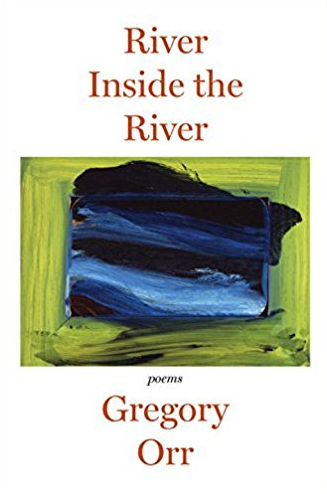Book by GREGORY ORR
Reviewed by
 Gregory Orr is a meditative poet. In his new book, River Inside the River, Orr again turns his inner eye to the power of words to reveal the essence of a thing, a movement, an emotion. He writes:
Gregory Orr is a meditative poet. In his new book, River Inside the River, Orr again turns his inner eye to the power of words to reveal the essence of a thing, a movement, an emotion. He writes:
River inside the river.
World within the world.All we have is words
To reveal the rose
That the rose obscures.
River Inside the River is a sequel to and extension of his 2005 collection Concerning the Book That is the Body of the Beloved. This is especially true in the third section, which bears the book’s title. In this section, as in Concerning the Book, Orr is at his best when he conjures Lao-tzu, the sixth-century BCE Chinese sage considered the founder of Taoism, and writes lines with Zenlike simplicity:
Bald, high-domed Taoist sage
Holding the Peach of Immortality
In one hand, a hiking staff in the other.
Critics have often noted the simplicity and clarity of Orr’s short, lyric poems, finding in them meditative and spiritual qualities and echoes of the ancient philosophy, which advocates among other precepts, harmony with nature as the basis of social equilibrium and personal contentment. That influence is clear in Concerning the Book. In the eponymous section of River Inside the River, Orr imagines the sage reciting a poem about eating a peach, its “sticky, delicious juice” dribbling down one’s chin (here, Orr channels William Carlos Williams’ “This is Just to Say” and “To a Poor Old Woman,” which conjure the irresistibility and “solace of ripe plums” in similarly unadorned language.) The meditation concludes:
He’s fresh from a rendezvous
With the beloved. Peach
And poem – both are her tokens.
Another such Taoist moment occurs later in the section when Orr, using the interchangeable he/she pronoun that some translators of the Tao te Ching, the foundational text of Taoism, have employed, describes the beloved as energy passing through objects in a material world:
And yet, it makes
Me dizzy –
The way he hides
In the flow of it,
The way she shifts
In fluid motions,
Becoming other things.
There are other images of simplicity and clarity: Water seeps through cupped hands (“liquid that is life and slips away.”) Sorrow and pleasure grow on the same tree, one flowers then fades, allowing the other to sprout. The third section stands as Orr’s ars poetica:
Risk all. Feel all.
Hold nothing back.
He tells the reader how to make a poem part of one’s life: Memorize lines as you would “every part of the beloved’s body.” Then Orr tells us to forget those lines—counsel that might come from Lao-tzu:
Let them vanish
Into that dark that’s large as death.They’ll come again
When you most need, least expect.
In “Eden and After,” a retelling of the Adam and Eve myth, Orr reflects on the creation of language, and by extension, of poetry:
To boast,
To sleep, to flirt:
Each verb had dew
Upon it, and was new.
This is the weakest section of River. Some images are compelling in isolation but are hard to connect to the poem as a whole, such as his description of a worm in “The Parade”: “A pink needle tugging / A black thread of tunnel, / Stitching a dark shroud.” The image is lovely, but nowhere else in that poem, or that section of the book, does Orr train his eye with such detail on any creature. Some lines come across as saccharine: “Eve liked to say ‘Yes,’ / Which was all / Adam needed to know.” A few feel incongruous, grotesque even, such as one that equates the quality of light on objects with afterbirth: “Each object gleamed – / Slick and shiny / With its afterbirth of light.” But stronger, more resonant images balance these out, such as: “Maybe his tongue was a root, / But weren’t his verbs wings?”
The middle section, “The City of Poetry,” makes a stronger companion to the third section. Orr imagines a city built from poetry. It is a city he knows intimately:
When I first came here
Fifty years ago –
The moment I arrived,
I knew this city was my home.
There are intensely personal moments in this section. Orr recounts the hunting accident at age twelve in which he killed his younger brother, and an incident as a Civil Rights activist in a Southern town when he was almost murdered. As he felt his world closing in, Orr sought refuge in poetry:
The poem was my ladder:
Rung and lifts of escape.
This city is filled with neighbors he loves. Each house acquires the characteristics of the poetry of its dweller. For example, angels dance all day on the roof of William Blake’s cottage, while “Whitman’s house / Is crowned with sod.” The second-floor windows of Emily Dickinson’s house are “[s]taring, startled, intelligent eyes.”
In an unnamed poem, Orr describes a country day thirty years before and recalls sitting by a pond near a farmhouse, a breeze bringing the fragrance of pines as his cat approaches: “I find it now in the city. I must / Have turned that day into words.” That transformation, the alchemy of poetry, is the crux of River Inside the River. Like a modern Lao-tzu engaging in and reflecting upon life, Orr has created a book as wise as it is lyrical.
Patrick Meighan‘s poems have appeared in Red River Review, Illya’s Honey, Flash!Point and other journals.



